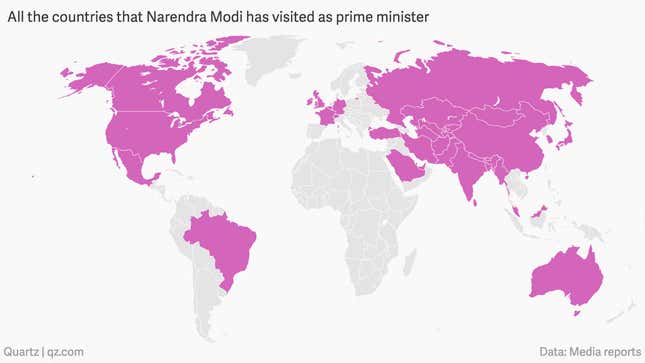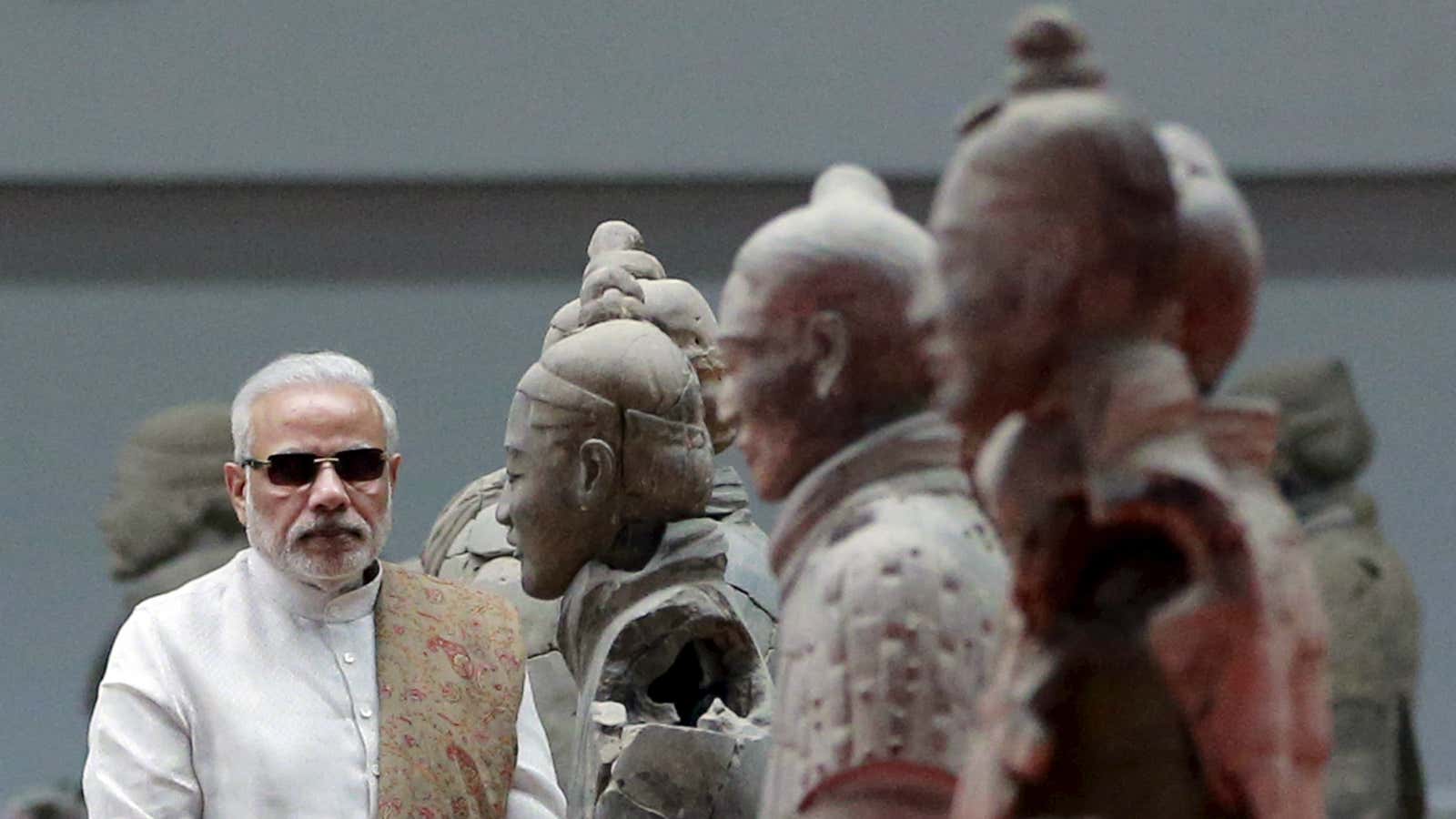Ever since he took charge as India’s prime minister in May 2014, Narendra Modi has made foreign policy a cornerstone of his administration.
Travelling frequently across the globe—Modi has already visited 38 countries in two years—he has managed to infuse a personal enthusiasm into India’s staid diplomatic establishment.
At his swearing-in ceremony, Modi brought together leaders from India’s neighbourhood. In two years, he has met US president Barack Obama seven times, even making him chief guest at India’s Republic Day celebrations. He has also met Chinese president Xi Jinping some seven times and has shaken hands with Russian president Vladimir Putin at least four times.
Not surprisingly, therefore, in his first interview to an Indian television news channel since taking charge, Modi was straight away asked about his foreign policy. And the prime minister had elaborate answers.
“Look, foreign policy is not about changing mindsets,” Modi told Times Now. “Foreign policy is about finding the common meeting points. Where do our interests converge and how much? We have to sit and talk with every country. It’s our ongoing effort.”

Engage with everyone
India must accept that a bi-polar world order is over, the prime minister explained. New Delhi, therefore, must engage with all countries. ”We also need to understand that earlier the world was bi-polar. Foreign policy would be centred around two super powers. India was a little late in realising that this bi-polar situation was for name’s sake,” Modi said.
“The world is interconnected and interdependent. You will have to connect with everybody at the same time. Even if there are two opposing countries, they will have to be friends. Now the times have changed,” he said.
As a result, the Indian prime minister’s approach involves giving due recognition to all.
“The amount of respect with which I engage Saudi Arabia, I engage Iran with the same amount of respect. The amount of respect with which I speak to America, I speak to Russia with the same amount of respect. So we need to understand this,” Modi said. “I abide by this principle.”
Chatting with the Chinese
Over the last two years, the Modi government has repeatedly reached out to China, but that hasn’t entirely worked. Last week, for instance, despite his best efforts, China stonewalled India from gaining entry into the Nuclear Suppliers Group.
But Modi is not dismayed.
“Even when the views are contradictory, talks are the only way forward and problems should be resolved through dialogue,” the prime minister said. “We don’t have one problem with China, we have a whole lot of problems pending with China.”
However, he added that during any bilateral interaction, his government makes India’s interests very clear to the Chinese. ”There are some basic differences,” Modi said. “But the most important thing is that we can speak to China eye-to-eye and put forth India’s interests in the most unambiguous manner. We are a government that takes care of India’s interests. We don’t compromise on this.”
The Pakistan obsession
Modi insists that India needs to stop comparing itself with Pakistan. ”It has been our biggest shortcoming and mistake that we have been tagging ourselves with another country and trying to do things. We are an independent country, we have our own policies and future,” he explained.
The so-called de-hyphenation may be a fair point, but the Modi government has drawn flak for its approach towards engaging with Pakistan. Most recently, just a week after the Indian prime minister paid a surprise visit to his Pakistani counterpart’s residence last December, terrorists attacked an Indian Air Force base in Punjab.
“Our effort for that engagement is continuing. But our supreme objective is peace. Our supreme objective is to protect India’s interests. We keep making efforts toward that objective and sometimes our efforts are successful,” Modi explained.
India’s approach, the prime minister emphasised, was already delivering dividends, and must be continued:
Like on the issue of terrorism, the world never bought India’s theory on terrorism. They would sometime dismiss it by saying that it’s your law and order problem. Today, the world has to accept what India has been saying about terrorism. India’s dialogue on terrorism, the losses India has suffered due to terrorism, the losses suffered by humanity, the world is now acknowledging that. So I believe we have to take this process forward.
Small is big
Modi’s itinerary in his first year in power wasn’t just about visiting India’s big global partners. The prime minister also took time out to stop by in a number of small countries in the Indian Ocean and the Pacific, especially those with a strong Indian diaspora, such as Fiji, Seychelles, and Mauritius.
“The small countries of the world are as important as the big nations,” Modi explained. “We had assumed that the relations with smaller nations would develop under the shadow of the bigger nations. I brought about a change in this.”
In Nov. 2014, India took the initiative to set up the Forum for India-Pacific Islands Cooperation (FIPIC). The FIPIC consists of 14 island countries—the Cook Islands, Fiji, Kiribati, Marshall Islands, Micronesia, Nauru, Niue, Palau, Papua New Guinea, Samoa, Solomon Islands, Tonga, Tuvalu, and Vanuatu.
“We have had two meetings. I went there once and they came here once. These are small countries with a population of about 10 lakh or 20 lakh,” Modi added.
“These small island nations are most affected by global warming. When India took up the international solar mission and 122 nations joined it, the island nations benefitted the most out of it. They are 50 in number now. A group of 50 nations feels secured with this vision of India.”
